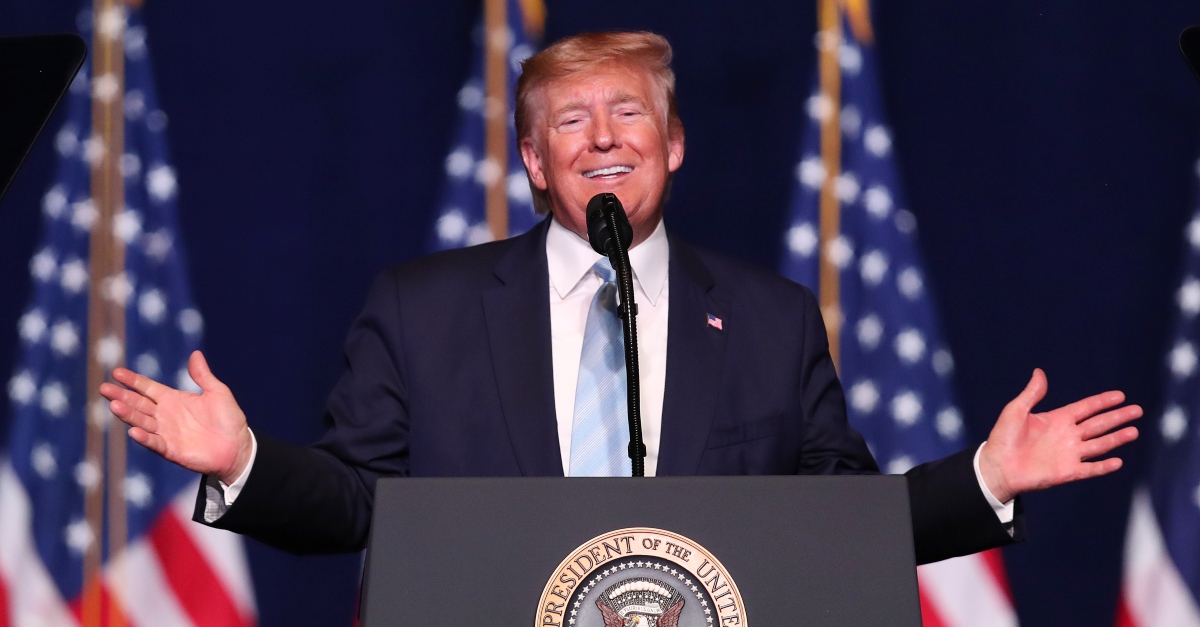
It appears Democrats have been thwarted again. The outcomes of two court cases of outsized importance to House Democrats’ rushed impeachment efforts against President Donald Trump will, in all likelihood, not be determined until after the U.S. Senate votes to acquit on Wednesday.
In a pro forma online message, the U.S. Court of Appeals for the District of Columbia announced that no forthcoming decisions whatsoever would be released on Tuesday.
“House lawyers had pleaded with the two appeals court panels to issue their rulings in a quick fashion before the Senate trial ended,” noted Politico senior reporter Darren Samuelsohn. Therefore, barring a big Wednesday surprise, the impeachment proceedings will conclude without either of these cases having any impact.
The cases themselves concern two distinct issues: (1) attempts to force testimony from former White House counsel Don McGahn; and (2) attempts to obtain a tranche of secret grand jury materials prepared by former special counsel Robert Mueller.
Democrats sought McGahn’s testimony by issuing a duly-authorized subpoena early on during the narrow impeachment inquiry. House investigators characterized McGahn’s knowledge of White House decisions as crucial to what Mueller himself described as potential obstruction of justice.
A voluntary document request was sent and ignored last March and Democrats followed up with a testimonial subpoena in April 2019. Then the executive branch intervened. By way of a sweeping broadside attack letter authored by current White House Counsel Pat Cipollone, Trump demanded that McGahn flout the subpoena “in order to protect the prerogatives of the office of the presidency.” The president’s former White House counsel dutifully complied with his former client’s directions.
The Department of Justice (DOJ) had McGahn’s and Trump’s backs on the matter, arguing in an acrimonious back-and-forth with House Democrats and the courts that the president and his closest advisors are entitled to absolute immunity from such requests and that “subjecting a senior presidential advisor to the congressional subpoena power would be akin to requiring the president himself to appear before Congress.”
U.S. District Judge Ketanji Brown Jackson was definitely not convinced. In November of last year, she issued a scathing 120-page ruling that demanded McGahn comply with the congressional subpoena.
“[T]he House of Representatives has the constitutionally vested responsibility to conduct investigations of suspected abuses of power within the government, and to act to curb those improprieties, if required,” the judge noted. “Accordingly, DOJ’s conceptual claim to unreviewable absolute testimonial immunity on separation-of-powers grounds–essentially, that the Constitution’s scheme countenances unassailable Executive branch authority–is baseless, and as such, cannot be sustained.”
DOJ, however, appealed that ruling and the U.S. Court of Appeals for the District of Columbia surprised no one—except for maybe the Democratic Party leadership—by not acting with much of any haste on the matter.
The second case ultimately met a similar fate.
In service of Mueller’s secret stash of grand jury documents—also known as the draft of his final report—Democrats started in earnest a little bit later, commencing this failed oversight effort in the courts well into the summer of 2019, though House Judiciary Chairman Jerrold Nadler (D-New York) technically requested those documents last spring. Nadler and his team finally asked a judge to get involved in late July 2019.
“When we win—and we will win the court fight because the legal excuses the White House has been using are extraordinarily weak from a legal point of view,” Nadler inaccurately predicted at the time. “When we win, it’ll open up the floodgates to enforce all the subpoenas and get all the testimony because they’re all the same nonsense legal arguments.”
DOJ, of course, vociferously fought off the Democrats over the Mueller information as well—and losing some initial rounds before telling the D.C. District Court that releasing thise grand jury materials would cause the agency irreparable harm. Appeals up the chain followed there as well.
“The Department of Justice takes extraordinary positions in this case,” Democrats argued in response to DOJ at one point in the long, drawn out process. “It does so to avoid disclosing grand-jury material needed for the House’s impeachment of President Trump and the Senate’s trial to remove him from office. This Court should reject DOJ’s efforts to insulate the President from Congress’s impeachment power.”
But that was ages ago in political time. Since then, Trump was impeached and he’s just a day away from proclaiming total vindication—engineered and abetted by a rock-solid grip in the Senate GOP caucus.
All for naught? Maybe not.
While it’s true the D.C. Circuit Court seemingly won’t rule on either case prior to Wednesday’s acquittal vote, House Democrats previously warned that Mueller’s materials could very well lead to a second and wholly separate impeachment inquiry.
Per the Democrats’ mid December filing:
[S]hould the [Judiciary] Committee obtain the withheld material, “it would be utilized, among other purposes, in a Senate trial on these articles of impeachment, if any.” And the Committee “has continued and will continue [its impeachment] investigations consistent with its own prior statements respecting their importance and purposes.” The withheld material could inform those investigations as well.
Both cases remain unresolved, but Democrats may still attempt to spin potentially favorable rulings to their political advantage. Just don’t hold your breath.
[image via Joe Raedle_Getty Images]